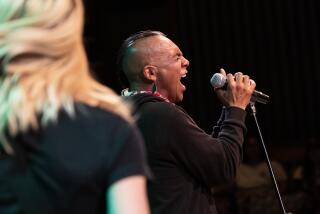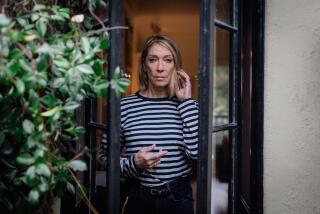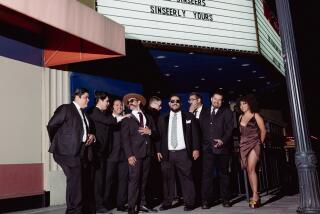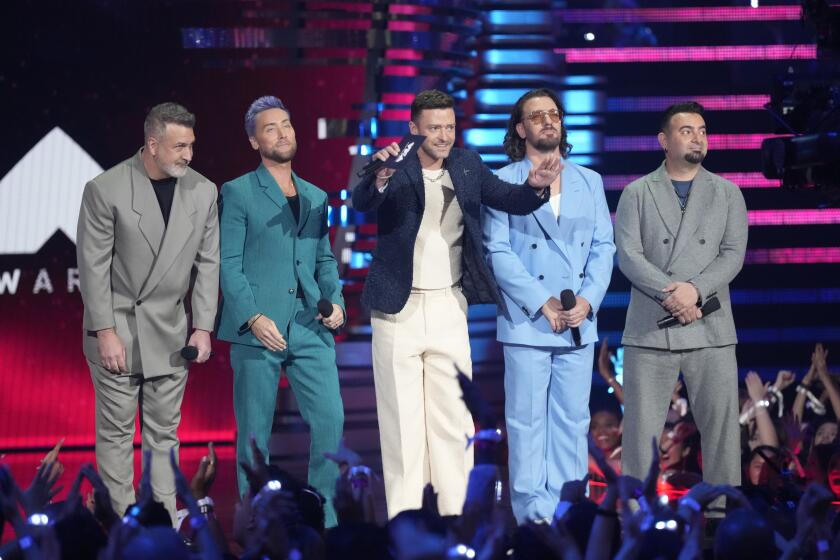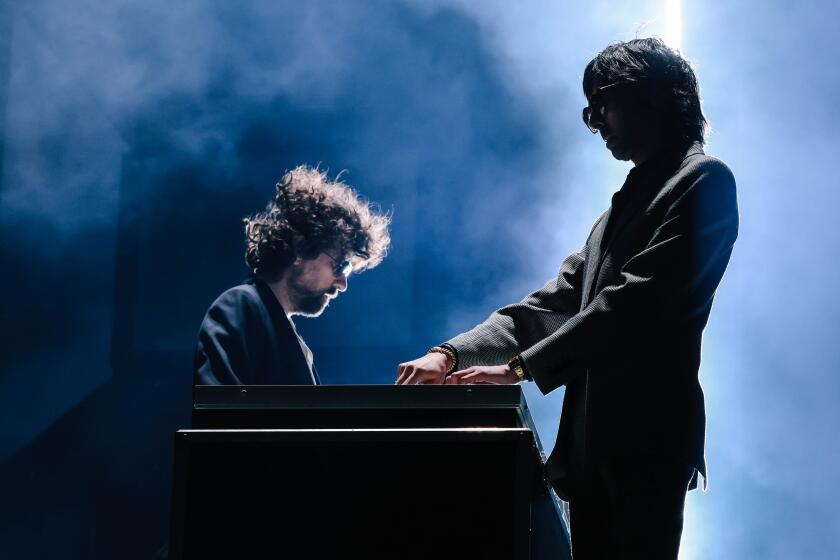Dawes plays it old school
It’s a hot, bone-dry, blue-skied day in the hills above Los Angeles — the kind of crystalline morning one might expect to see Neil Young, Joni Mitchell and the Byrds’ Gene Clark relaxing on a redwood deck strumming acoustic guitars.
But the guys from canyon-rock band Dawes — acolytes of this very era — sitting on a tree-shaded porch beside the house they share, are not wearing western shirts. The air is scented with eucalyptus, but they are not smoking weed. Inside their home, the bookshelves hold stacks of the Believer, not yellowed copies of Mojo.
“Laurel Canyon has the mystique,” says Taylor Goldsmith, 25, the group’s singer and guitarist. “But it’s just not the same place. Now it’s traffic and … rich people. There’s no real possibility for any artistic community there.”
Goldsmith’s attitude is startling, because his band’s two albums — “Nothing Is Wrong” came out in June — are as open-hearted and earthy as the classic canyon rock of the ‘60s and ‘70s. The new album’s opening number, “Time Spent in Los Angeles,” has the yearning — as well as the three-part harmonies — that evoke the period directly.
But Dawes sort of wandered into their sound when they recorded their first LP.
“People say, ‘Oh, you have this real California thing,’” Goldsmith says as his little brother Griffin, 20, the band’s drummer, stares mutely through large sunglasses. “But I wasn’t even aware of it. I wasn’t hip to Jackson Browne; I wasn’t hip to Warren Zevon. It wasn’t, ‘OK, guys, let’s show them we’re from California.’”
The spirit of those old records may just work through osmosis, he says. “It’s nice to believe there’s a quality of the place that permeates the music.” This summer the band is touring the East Coast and jumping across the sea for a few London gigs before heading to the Santa Monica Pier for a free homecoming show on Sept. 1.
Dawes grew out of unlikely soil: The Goldsmith boys are the sons of musician Lenny Goldsmith, who served in the ‘70s as singer for Bay Area funksters Tower of Power. Dad told them to stay away from Dylan, the Grateful Dead and other music he saw as lazy and not virtuosic enough, and pushed the lads toward Otis Redding. (Goldsmith senior is now a Malibu-area Realtor.)
But Taylor and Griff eventually drifted to the mellow tradition of their native land — after several detours. When Beachwood Sparks released the singles that helped sparked the canyon revival around 1998, Goldsmith was 12 and too interested in Green Day and Weezer to notice.
“I feel a little late to the party,” he says, “with a lot of the artists who mean the most to me.”
After high school Taylor formed the power-pop band Simon Dawes, that put out a hook-rich album, “Carnivore,” in 2006. Griff remembers his older brother being away on tour most of the time. “There wasn’t much for me to do,” he recalls, “but sit in the garage and play along with [John] Bonham and Levon [Helm].”
Around this time, producer Jonathan Wilson was holding mostly acoustic jams at his Laurel Canyon home, drawing musicians including Conor Oberst, Elvis Costello and members of Wilco. Dawes showed up one night, playing a Blind Faith tune; Wilson was impressed by their chemistry and what he calls their groove.
“But when they came back with songs, and we talked about making a record, that’s when I was the most excited by it,” Wilson says. “Everyone can be a fan of the right stuff, but if you don’t have the perspective or the tunes, you might as well be a covers band.”
Dawes’ debut, “North Hills,” named for the San Fernando Valley town where the Goldsmith boys grew up, came out in 2009 and introduced the band’s rustic sound. At first, the group distributed the record on tour while opening for bands like Langhorne Slim, Delta Spirit and Deer Tick. (Taylor has since recorded with “folk rock supergroup” Middle Brother, which includes members of the latter two bands.)
Lending the band’s complex relationship to Laurel Canyon a literal analogue, Wilson’s home studio — in which they made “North Hills” — was dismantled and rebuilt in Echo Park, where the group recorded “Nothing Is Wrong.” (Dawes also includes Wylie Gelber on bass and Tay Strathairn on keyboards.)
The instrumentation on “Nothing Is Wrong” remains old-school: Sampling and electronics don’t much interest them. (Taylor plays a modified Telecaster — the first mass-production solid-body guitar — as well as a battered but beautiful 1964 Gibson J-45 acoustic.)
“We were always raised to play our instruments well,” says Taylor, “and to play them for their natural sounds.” The album was recorded on analog equipment — including Jackson Browne’s old Studer tape machine — and largely without editing or overdubs. Dawes, in fact, performed as Browne’s backing band Wednesday night at the Satellite in Silver Lake as a warm up to a string of dates they’ll perform together in Spain.
Taylor compares the process to writing on a typewriter rather than a word processor, where your mistakes become more or less permanent. “It forces you to be on your game,” he says. “The way records used to be made.”
Their heroes remain older artists. The group, which has played at the “Big Pink” house in Woodstock where the Band recorded its first album, recently appeared on U.S. and British television appearances with Robbie Robertson. It shows the group coming full circle, since Robertson’s ragged and glorious old group was one of Dawes’ original inspirations.
“They’re the most romantic band ever,” Taylor says of Dylan’s old backup group. “It’s like an egoless experience — the songwriter doesn’t sing, the singers don’t sing behind the instruments you normally sing behind. You feel like you know all five guys. There’s no solo, or the whole band solos. That’s what being in a band is all about.”
More to Read
The biggest entertainment stories
Get our big stories about Hollywood, film, television, music, arts, culture and more right in your inbox as soon as they publish.
You may occasionally receive promotional content from the Los Angeles Times.
